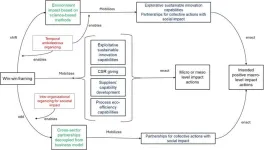(Press-News.org) TUCSON, Arizona — Researchers at the University of Arizona Mel and Enid Zuckerman College of Public Health and the U of A Native Nations Institute are establishing a framework that protects the way Indigenous data is collected and used around the world, thanks to a $1.5 million grant from the National Science Foundation.
For as long as researchers, health care providers and government agencies have studied Indigenous communities, there has been mistrust about the data collected. Indigenous peoples have raised concerns about who owns and profits from the data, as well as how it is used. Using the grant, the researchers, in partnership with colleagues from the University of California, Los Angeles and New York University, will leverage a worldwide system of policies, practices and collaborative norms geared to place Indigenous peoples as authorities over the way their data is collected, shared and controlled.
“What we’ve seen from tribal governments is that being able to work and connect with other entities internationally and connect over some of the same experiences has been beneficial,” said principal investigator Stephanie Russo Carroll, DrPh, MPH, an associate professor at the Zuckerman College of Public Health with shared appointments as an associate research professor at the Udall Center for Studies in Public Policy and the Native Nations Institute. “This grant provides funding in an arena where we’ve never had funding before: linking up existing research and policy-focused networks toward advancing Indigenous data sovereignty.”
The significance of these connections is echoed by Ibrahim Garba, MA, JD, SJD, a co-investigator on the project and an assistant research professor at the Zuckerman College of Public Health with a shared appointment as a senior researcher at the Udall Center and its Native Nations Institute.
“These links are key in a conversation that is newly emerging, involving numerous players handling various types of Indigenous data across multiple contexts,” Garba said.
The project will bring together scholars who focus on Indigenous data sovereignty, law, policy, information management, data governance, genomic sciences and the history of technology to create training, resources and processes for researchers and research institutions such as universities, funders, federal agencies and publishers.
Carroll, who is Ahtna and a citizen of the Native Village of Kluti-Kaah in Alaska, will lead the establishment of an alliance among 12 Indigenous data sovereignty and governance networks that span the globe. Those networks include the Global Indigenous Data Alliance and six Indigenous data sovereignty networks representing the United States, Canada, Australia, New Zealand and the Sapmi region, which spans northern Europe. The network will also include five international Indigenous data governance research collectives: the National Science Foundation-funded Center for Braiding Indigenous Knowledges and Science, the Equity for Indigenous Research and Innovation Coordinating Hub, the Collaboratory for Indigenous Data Governance, Local Contexts and Ngā Pae Te Māramatanga.
The project will create a web portal, dubbed the Indigenous DataSET (Sovereignty and Ethics Training) Hub, which will host and link to training, processes and documents meant to guide researchers and institutions.
Other plans include working to align scientific research with local Indigenous communities’ data governance standards and protocols, supporting Indigenous data scholars, expanding the reach of the networks worldwide and forging collaborations among Indigenous data sovereignty leaders and movements.
Project activities will work to disrupt contemporary data practices and use tools to reveal inherent biases in data collection, storage and circulation. Ultimately, the measures are designed to advance science in service to communities.
Carroll previously worked with international scholars to create the CARE Principles for Indigenous Data Governance. The protocols promote Indigenous peoples’ collective sovereignty over the application and use of their data and knowledge for their collective benefit.
The CARE Principles include the collective benefit of data collection and use, authority to control the data, and responsibility to the people affected, all driven by a code of ethics. They call for policies that are meant to protect Indigenous peoples, with control and guidance implemented by the tribes.
Carroll said Indigenous leaders have embraced the effort to connect entities in a global network with a shared cause of reestablishing connections with data, protecting data and collaborating on new policy ideas.
“What we’ve been noticing over the past six months or so is an explosion in tribal departments or tribes at large contemplating and beginning to draft tribal laws and policies around data, as well as federal and state government policy development,” Carroll said.
Other co-investigators include Nanibaá Garrison, PhD, an associate professor at the University of California, Los Angeles, and Jane Anderson, PhD, an associate professor at New York University.
This research is supported by the National Science Foundation’s Office of International Science and Engineering under Award No. 2412372.
END
$1.5 million grant will build global network to prevent exploitation of Indigenous data
Researchers will collaborate with entities worldwide to develop protocols and practices that ensure control over collection, use, storage and sharing of data related to Indigenous communities stays with the people it affects.
2024-08-12
ELSE PRESS RELEASES FROM THIS DATE:
Engineers bring efficient optical neural networks into focus
2024-08-12
EPFL researchers have published a programmable framework that overcomes a key computational bottleneck of optics-based artificial intelligence systems. In a series of image classification experiments, they used scattered light from a low-power laser to perform accurate, scalable computations using a fraction of the energy of electronics.
As digital artificial intelligence systems grow in size and impact, so does the energy required to train and deploy them – not to mention the associated carbon emissions. Recent research suggests that if current AI server production continues at its current pace, their annual energy consumption could outstrip that of ...
"All of us urgently need to band together to pass a robust and just earth to future generations," says eminent environmental lawyer Edith Brown Weiss
2024-08-12
Amsterdam, August 12, 2024 – An article in a special issue on The Planetary Future published in Environmental Policy and Law (EPL) by IOS Press (now part of Sage), considers the Planetary Trust as an essential framework underlying today’s kaleidoscopic world, reviews important developments in implementing the Trust, and focuses on important steps to take now to ensure a just, robust Earth system for present and future generations.
Bharat H. Desai, PhD, Jawaharlal Nehru University, Centre for International Legal Studies, and Editor-in-Chief ...
Framing sustainability strategies for the enactment of corporate actions with positive macro-level impact: Evidence from a developing country
2024-08-12
Transforming Sustainability Strategies: Ecuadorian Corporations Leading the Way
The Bigger Picture: Shifting from Micro to Macro Impacts
The research redefines sustainability by examining how strategic framing can elevate corporate actions to achieve significant macro-level impacts. Moving beyond individual and community-focused efforts, the study highlights broad-scale changes that enhance societal and environmental well-being, including nationwide poverty reduction, environmental improvements, and public health advancements.
Corporations ...
Comparative safety of in utero exposure to buprenorphine combined with naloxone vs buprenorphine alone
2024-08-12
About The Study: There were similar and, in some instances, more favorable neonatal and maternal outcomes for pregnancies exposed to buprenorphine combined with naloxone compared with buprenorphine alone. For the outcomes assessed, compared with buprenorphine alone, buprenorphine with naloxone during pregnancy appears to be a safe treatment option. This supports the view that both formulations are reasonable options for the treatment of opioid use disorder in pregnancy, affirming flexibility in collaborative treatment decision-making.
Corresponding ...
Pink elephants in the brain?
2024-08-12
Our brain interprets visual information by combining what we see with what we already know. A study published in the journal Neuron by researchers at the Champalimaud Foundation, and supported by the CaixaResearch Health Call of the la Caixa Foundation, reveals a mechanism for learning and storing this existing knowledge about the world. They found that neurons are wired to connect seemingly unrelated concepts. This wiring may be crucial for enhancing the brain’s ability to predict what we see based on past experiences, and bring us a step closer to understanding how this process goes awry ...
Heat caused over 47,000 deaths in Europe in 2023, the second highest burden of the last decade
2024-08-12
More than 47,000 people died in Europe as a result of high temperatures in 2023, the warmest year on record globally and the second warmest in Europe. This is the estimate of a study led by the Barcelona Institute for Global Health (ISGlobal), a centre supported by the "la Caixa" Foundation, and published in Nature Medicine. The researchers report that the vulnerability to heat of European societies has progressively decreased over the present century, and estimate that without these societal adaptation processes, the heat related mortality burden over the past year would have been 80% higher.
The study replicates the methodology used last year in another paper ...
Early-childhood tablet use and outbursts of anger
2024-08-12
About The Study: Child tablet use at age 3.5 years was associated with more expressions of anger and frustration by the age of 4.5 years in this study. Child proneness to anger/frustration at age 4.5 years was then associated with more use of tablets by age 5.5 years. These results suggest that early-childhood tablet use may contribute to a cycle that is deleterious for emotional regulation.
Corresponding Author: To contact the corresponding author, Caroline Fitzpatrick, PhD, email caroline.fitzpatrick@usherbrooke.ca.
To access the embargoed ...
Alcohol consumption patterns and mortality among older adults with health-related or socioeconomic risk factors
2024-08-12
About The Study: In this cohort study of older drinkers from the UK, even low-risk drinking was associated with higher mortality among older adults with health-related or socioeconomic risk factors. The attenuation of mortality observed for wine preference and drinking only during meals requires further investigation, as it may mostly reflect the effect of healthier lifestyles, slower alcohol absorption, or nonalcoholic components of beverages.
Corresponding Author: To contact the corresponding author, Rosario Ortolá, MD, PhD, ...
An appetizer can stimulate immune cells’ appetite, a boon for cancer treatments
2024-08-12
(Santa Barbara, Calif.) — The body has a veritable army constantly on guard to keep us safe from microscopic threats from infections to cancer. Chief among this force is the macrophage, a white blood cell that surveils tissues and consumes pathogens, debris, dead cells, and cancer. Macrophages have a delicate task. It’s crucial that they ignore healthy cells while on patrol, otherwise they could trigger an autoimmune response while performing their duties.
Researchers at UC Santa Barbara sought to understand how these immune cells choose what and when to eat. A paper published ...
New genetically engineered wood can store carbon and reduce emissions
2024-08-12
Researchers at the University of Maryland genetically modified poplar trees to produce high-performance, structural wood without the use of chemicals or energy intensive processing. Made from traditional wood, Engineered wood is often seen as a renewable replacement for traditional building materials like steel, cement, glass and plastic. It also has the potential to store carbon for a longer time than traditional wood because it can resist deterioration, making it useful in efforts to reduce carbon emissions.
But the hurdle to true sustainability in engineered wood is that it requires processing with volatile chemicals and a significant amount of energy, and ...
LAST 30 PRESS RELEASES:
Novel camel antimicrobial peptides show promise against drug-resistant bacteria
Scientists discover why we know when to stop scratching an itch
A hidden reason inner ear cells die – and what it means for preventing hearing loss
Researchers discover how tuberculosis bacteria use a “stealth” mechanism to evade the immune system
New microscopy technique lets scientists see cells in unprecedented detail and color
Sometimes less is more: Scientists rethink how to pack medicine into tiny delivery capsules
Scientists build low-cost microscope to study living cells in zero gravity
The Biophysical Journal names Denis V. Titov the 2025 Paper of the Year-Early Career Investigator awardee
Scientists show how your body senses cold—and why menthol feels cool
Scientists deliver new molecule for getting DNA into cells
Study reveals insights about brain regions linked to OCD, informing potential treatments
Does ocean saltiness influence El Niño?
2026 Young Investigators: ONR celebrates new talent tackling warfighter challenges
Genetics help explain who gets the ‘telltale tingle’ from music, art and literature
Many Americans misunderstand medical aid in dying laws
Researchers publish landmark infectious disease study in ‘Science’
New NSF award supports innovative role-playing game approach to strengthening research security in academia
Kumar named to ACMA Emerging Leaders Program for 2026
AI language models could transform aquatic environmental risk assessment
New isotope tools reveal hidden pathways reshaping the global nitrogen cycle
Study reveals how antibiotic structure controls removal from water using biochar
Why chronic pain lasts longer in women: Immune cells offer clues
Toxic exposure creates epigenetic disease risk over 20 generations
More time spent on social media linked to steroid use intentions among boys and men
New study suggests a “kick it while it’s down” approach to cancer treatment could improve cure rates
Milken Institute, Ann Theodore Foundation launch new grant to support clinical trial for potential sarcoidosis treatment
New strategies boost effectiveness of CAR-NK therapy against cancer
Study: Adolescent cannabis use linked to doubling risk of psychotic and bipolar disorders
Invisible harms: drug-related deaths spike after hurricanes and tropical storms
Adolescent cannabis use and risk of psychotic, bipolar, depressive, and anxiety disorders
[Press-News.org] $1.5 million grant will build global network to prevent exploitation of Indigenous dataResearchers will collaborate with entities worldwide to develop protocols and practices that ensure control over collection, use, storage and sharing of data related to Indigenous communities stays with the people it affects.



